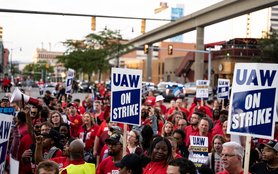A system that taxes the working poor but not the ultra-wealthy isn’t just unfair—it’s outrageous.
Every day presents a new gift to billionaires and corporations right now, but Tax Day wraps it in a box and puts a bow on it. For working families wondering how they will afford food, the tax system doesn’t miss a beat on collections; but the ultra-wealthy happily pull strings that enable them to avoid paying their fair share.
The basic principle that guides the tax system is simple: Tax rates should increase as income increases. And, in fact, the personal income tax is progressive—except when it comes to the ultra-rich.
The numbers tell a story that should make everyone’s blood boil: according to leaked tax returns, the top 25 billionaires paid only 3.4 percent in federal income tax between 2014 and 2018.
Jeff Bezos (worth $177 billion) paid a true tax rate of less than one percent in that period.
Many corporations pay lower tax rates than most working families: some large corporations in the US paid as little as $0 in federal taxes on profits in 2020.
The average taxpayer? 13 percent.
Put this in context in 2022. While the average worker is facing an actual decline in the real value of wages, billionaires have added trillions to their net worth (up 62 percent since March 2020, from $2.9 to $4.7 trillion), and corporations are enjoying jaw-dropping record profits, soaring by to 37% to $2.8 trillion (in many cases by jacking up prices).
IT’S NO ACCIDENT THAT WE’RE SEEING STAGGERING LEVELS OF INEQUALITY
It’s by deliberate design. For decades, the ultra-wealthy and corporations have used their economic might to pressure Congress to write the rules so they can avoid taxes, pay poverty wages, and skirt responsibility.
This is a departure from our history of investing in working people. During WWII, the top federal income tax rate peaked at 94 percent; it was still 70 percent three decades later. We used tax revenues to fund vital new programs, from Medicaid to mass transit to school lunch programs to education. The middle class grew, and thrived.
The Reagan Revolution of the 1980s began the rollback of these principles, and of relative equality in general. As taxes declined, inequality increased, and the safety net began to disintegrate.
We need to sound the alarm: working families are feeling the sharp edge of economic insecurity and loss of hope in the future.
Working our lives away
For example, meet Susan and Tanya (who preferred we not use their real names), a couple in their late twenties. They live together in a modest home in Massachusetts, and both work full time at a supermarket. After 12 years, Susan earns $15.50 an hour, working in the meat department; Tanya earns $14.25, covering the pet supply aisle. Susan earns $620 a week, $2686 a month. She ticks off what she owes each month: rent, food, car loan, car insurance, gas, utilities.
While they’ve been walking a tightrope for years, they note, “all of a sudden, everything is going up. How are we supposed to afford all this?” When it recently cost $500 to fill the oil tank, Susan had to ask her father to take care of it. They keep the apartment so cold that Tanya, who has Raynaud’s disease, says “it sucks to walk into the house every day.”
Because they need to live a ways from the city to afford rent, they need a car. “And now, $30 doesn’t fill the gas tank.” They don’t have internet access.
The price of food is skyrocketing. The USDA Thrifty Food Plan notes monthly food prices for a family have gone from $654 in February 2020 to $888 in February 2022—an increase of more than a third.
“It’s gotten worse lately. We bought about six things from the supermarket the other day, and it came to $50. It wasn’t meat or cleaning products or anything like that. Our diet is all cheap foods, like pizza and fast food. We can’t afford a nice meal on the table. There are days when I’m, like, I’d rather have nothing to eat because I don’t want to use my mom’s money.”
Still, they consider themselves luckier than some of their colleagues. “There are people working two jobs to support their families. One guy in the meat department has been there for 23 years, and he’s making $17 an hour. He goes from here to another job, home to bed, and then back here.”
“We’re literally working our lives away,” says Tanya. “You’re 75 years old by the time you can stop.”
Countless households have stories like this.
Still, there is more to this story. What is most striking is not how the ultra-rich have warped the tax system, the wage system, and the social safety net. It’s how we’ve come to accept it.
Billionaires and corporations have seized the narrative; they’ve rewritten the rules and the story.
And in doing so, they’ve altered the social fabric so we’re resigned to these disparities—accepting outrageous wealth while knowing that countless families are falling into poverty and facing food insecurity.
It doesn’t have to be this way. On Tax Day, let’s take a moment to consider a better option: let’s tax those who have amassed shocking amounts of wealth, in order to fund programs that protect the future of working families.
For more on the funds we could generate with specific taxes on billionaires and corporations, check out our media brief: Tax the rich. Invest in a better world.
_______________________________________________




